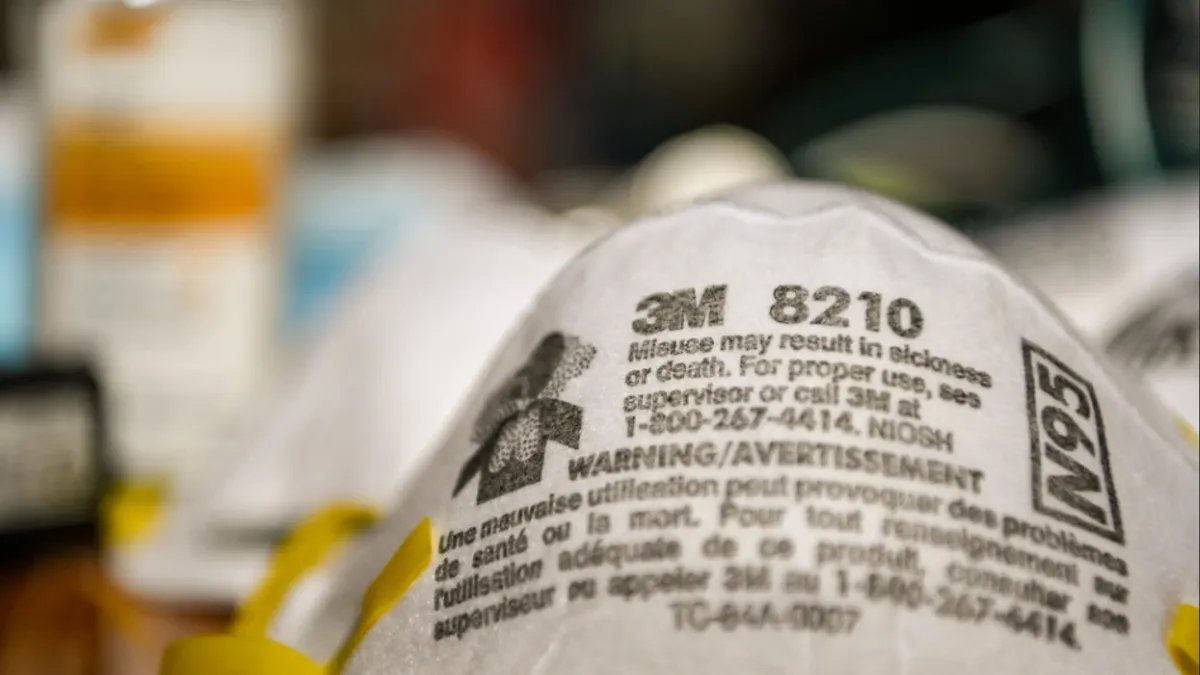UPDATE: Oct. 26, 2020: The Occupational Safety and Health Administration has come out with clear guidance stating that N95 respirators protect wearers from the coronavirus. Responding to claims that N95 respirator filters do not capture particles as small as the virus, the agency explained why an N95 respirator is effective at protecting users from the virus that causes COVID-19.
"N95 refers to a class of respirator filter that removes at least 95% of very small (0.3 micron) particles from the air. Some people have mistakenly claimed that since the virus that causes COVID-19 is approximately 0.1 microns in size, wearing an N95 respirator will not protect against such a small virus. That mistaken claim appears to result from a misunderstanding of how respirators work," the agency said.
The N95 respirator filter, as well as other NIOSH-approved respirators, is very effective at protecting workers from the virus, the agency said. However, it is important for employers and workers to remember that the respirator only provides the expected protection when used correctly, it added.
Dive Brief:
- Recent federal government guidance cautions workers looking to protect themselves from hazards such as sand, silica dust or the coronavirus to carefully consider the source of their respiratory protection.
- The National Institute for Occupational Safety and Health, which is part of the Centers for Disease Control and Prevention, says counterfeit respirators are being sold in the U.S. and that the models — many of them made in China — may not be capable of providing appropriate respiratory protection.
- NIOSH has posted a list of dozens of suspect brands on its website as well as what to look for in approved face coverings.
Dive Insight:
Some of the brands listed as counterfeit include:
- Valmy model VRN95
- INSAFE
- DermaCare or Espomega with model numbers HY8710, HY8812 and HY8816
- Intech Safety Pvt. Ltd.
- Safe Life model B130 and model B150
- SAS model 8617A
- Some models claiming to be from Shining Star Electronic Technology
NIOSH-approved respirators have an approval label on or within the packaging of the respirator and/or within the instructions containing one the following designations: N95, N99, N100, R95, R99, R100, P95, P99 or P100. Signs that a respirator may be counterfeit include:
- No markings.
- NIOSH spelled incorrectly.
- The presence of decorative fabric or other decorative add-ons such as sequins.
- Claims approved for children. (NIOSH does not approve any type of respiratory protection for children.)
- Ear loops instead of headbands.
Besides helping to mitigate the spread of the coronavirus, N95 masks provide protection from harmful airborne particles created when performing certain types of work such as sanding, drilling concrete, installing insulation and remediating lead paint.
While approved for use in construction, valved N95 masks are not suitable for COVID-19 mitigation as they can decrease the protection of those surrounding the wearer, recent studies have shown.
“Such a valve allows air to move from the wearer’s mouth and nose through the mask without going through the main filter,” one study said. “While this may make exhaling easier, at the same time, it may permit viruses to get on through to the other side.”
The new guidance points to the fact that contractors should carefully consider where they buy their masks. Many of the problem masks come from online retailers, auction sites like eBay and third-party distribution networks. NIOSH lists warning signs that a retailer is suspect, such as offering a very low price compared to other outlets.
It is also important to see if the seller is marketing the same products over time or primarily selling trendy items, the institute said.
"Legitimate businesses and distributors typically sell what they know and stay consistent with their stock over time. A buyer should be able to discover this by looking into businesses' other products," it said, adding that buyers can gain insight on sellers on big online platforms such as Amazon by looking at reviews from buyers.















